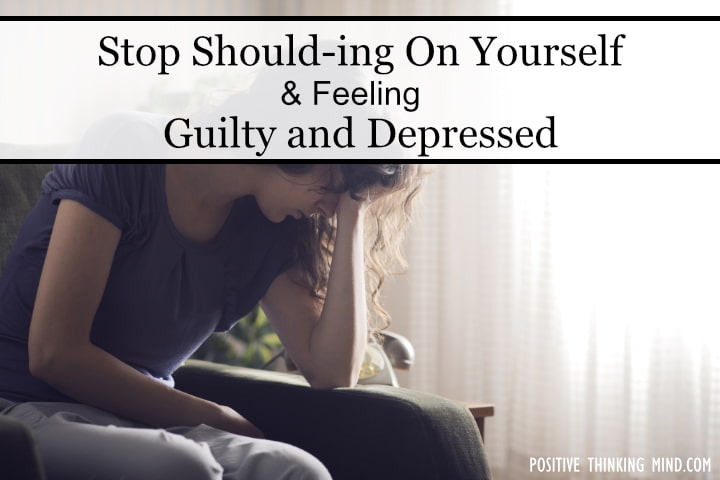Stop Should-ing On Yourself And Feeling Guilty And Depressed
Are you always saying you should do something and then feel guilty about not doing it?
Or is it something you shouldn’t have done and feel guilty about?
The main reason we feel guilty is that we’re not living up to our shoulds which then, in turn, hurts and lowers our self-esteem and self-confidence.
As our self-esteem and confidence are lowered, we begin to feel anxious and stressed or left feeling depressed.
❤️🔥➡️Join me in my Complete Guide To Self-Esteem Course – I’ll hand you a self-esteem-boosting set of tips and abilities, actions, best practices and more.
Karen Horney, a German psychoanalyst, noticed this pattern among people who were depressed or feeling guilty, and these people always said, “I should.”
She coined the term, The Tyranny of the Should, and she viewed shoulds as dividing our personalities into two selves, our ideal self, and our real self.
A should statement is usually based on what you believe your ideal self or your thought self should be.
Let’s quickly look at some examples of should statements that are a form of cognitive distortion and are something you feel is true regardless of the circumstances.

Should Statements
I should spend more time with my family.
I should spend more time with my kids.
I shouldn’t drink so much.
I should find a better job.
I should exercise more.
I should spend more time with my friends.
I should lose weight.
I should never make mistakes.
I should have been promoted by now.
I should save more money.
I should get more sleep.
As I said earlier, these are all cognitive distortions, and using should or shouldn’t can often be self-defeating.
We can’t live up to our idealized version of ourselves, which creates a feeling of guilt, lack of self-control, and depression.
Trying to live up to our ideal self can be very stressful and make us anxious when we don’t live up to our shoulds.
Shoulds can be discouraging, and they don’t help us create change.
Feeling guilty and overwhelmed causes inaction.
The more you feel like you “should” do something, the less likely you’ll actually do it.
Psychologist Clayton Barbeau coined the term “shoulding yourself.”
This means putting pressure on yourself to do or be something based on what you think you should do or be.
You should be better at this, for example.
Ways To Break The Shoulding Yourself Cycle
So let’s begin by questioning our shoulds.
Ask ourselves why we should or shouldn’t do that.
Digging deeper into your should beliefs, often you’ll find they don’t hold up.
Often you’ll find you don’t have an answer to your should statement, and you can begin to let them go.
This should or shouldn’t belief you have may have been learned at an early age, maybe from a parent or other children.
These beliefs may be societies, or culture and not our own
You don’t have to feel bad about that particular should anymore because you realize you don’t have to live up to that should statement.
We can’t just dismiss some shoulds, though, like when you want to spend more time with your kids and be a better parent.
In this instance, change how you speak to yourself and make it more intentional.
Instead of saying I should spend more time with my kids, say, I’m going to spend more time with my kids.
Or, I could take a break from what I’m doing and be more engaged with my kids.
Or, I should exercise more, say, I’m going to do my best to exercise more and take better care of myself.
Another example, I shouldn’t order food out so much.
Say, I’d like to start cooking and eating healthier.
Rephrase your shoulds with a less judgemental voice like,
I’ll do my best.
I plan to
I’d like to
Rephrasing and being less judgemental about yourself can help from hurting your self-esteem.
Another way is to be mindful and self-aware of your shoulds.
Pay close attention to your thoughts and try to notice when a should statement enters your mind.
Once you realize it, accept the thought and then rephrase it.
Continue to question your shoulds from earlier, and ask yourself if you do or don’t want to do this, or is this should society’s norm telling you to do this?
Be self-aware and discover the root or origins of your should statement.
If you’re having trouble being mindful about your thoughts, ask your partner, family member, or close friend to help you point out that your saying should.
Just as we don’t like other people telling us we should do something, when telling ourselves we should do something, the less we want to do it.
Reducing our should statements and being less judgemental of ourselves will lead to lower anxiety and stress levels.
We’re less likely to be depressed and feel guilty.
It will take time and repetition and learning even more skills, which you can learn by taking my self-esteem course.
My course will give you in-depth techniques to help eliminate your should statements and strategies needed to build self-esteem.
The self-esteem course has 18 video lessons along with an ebook download, the Complete Guide to self-esteem,
You’ll also get a 73-page workbook including Building Exercises and a Self-Esteem Journal; you’ll learn to identify your strengths and weaknesses, build an action plan, and many more bonuses.
Anyway, I hope you’re well on your way to replacing your shoulds in a more positive way that’s more helpful to you.
Remember, you are amazing and unique, and I want you to live life to the fullest.
I believe in you, and I want you to believe in you.
Stay positive, friends.
